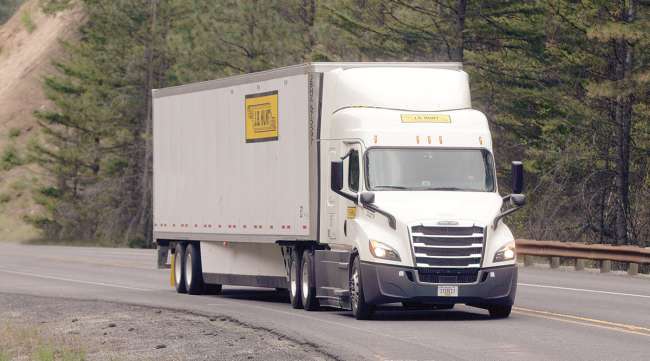Staff Reporter
J.B. Hunt Reports $2.9 Billion in Revenue for Q2

[Stay on top of transportation news: Get TTNews in your inbox.]
J.B. Hunt Transport Services reported that second-quarter net income declined on revenue that fell just short of $3 billion.
The Lowell, Ark.-based transportation and logistics company on July 16 posted net earnings of $135.9 million, or $1.32 a diluted share, for the three months ending June 30. That compared with $189.6 million, or $1.81, during the same time the previous year. Total revenue decreased by 7% to $2.93 billion from $3.13 billion. Operating income decreased 24% to $205.7 million compared with $270.7 million a year ago.
“We remain committed to our investments and managing the business with a long-term mindset,” CEO Shelley Simpson said. “These investments span across our company foundations, which include our people, our technology and our capacity. Through investments in these key areas, we have a significant number of opportunities to provide value to and on behalf of our customers across our suite of complementary service offerings.”
The results missed expectations from investment analysts on Wall Street, who had been looking for EPS of $1.51 and quarterly revenue of $3.04 billion, according to Zacks Consensus Estimate.
“Our focus remains on deploying capital in areas of the transportation industry where we see a long-term opportunity to generate compounding returns,” Simpson said. “We operate in an industry that is cyclical, but we have focused on businesses and areas that we feel confident we can compete effectively, take share, and win. We do this by remaining financially disciplined, keeping our focus on the long term while managing costs in the near term.”
Hear from J.B. Hunt President and CEO Shelley Simpson as she talks about our second quarter earnings. To read the full earnings press release, visit https://t.co/CnDngLZIpB https://t.co/Nug4T6WdMh — J.B. Hunt 360 (@jbhunt360) July 16, 2024
Simpson acknowledged that the first half of this year had been challenging from a financial standpoint but is optimistic the company will deliver value for customers. J.B. Hunt has made providing value for customers, returns for shareholders and investing in company fundamentals its top priorities.
“While admittedly the market has been challenging, we have invested throughout this downturn to set us up for future growth and success across the business,” Simpson said. “We continue to focus on controlling expenses in the near term without jeopardizing our long-term potential, managing our headcount through attrition, while at the same time continuing to deploy and enhance our technology to increase the productivity of our people.”
The company’s Truckload segment saw Q2 revenue decrease 12% to $168.1 million from $191.8 million. The revenue decline was due to a decrease in load volume and revenue per load, Hunt said. Total average effective trailer count decreased 4%. Operating income in the segment declined 7% to $3.55 million from $3.8 million, driven primarily by the revenue decline.
Final Mile Services segment Q2 revenue increased 5% to $235.3 million from $223.9 million. The rise was primarily driven by multiple new contracts implemented over the past year and partially offset by ongoing efforts to improve revenue quality and profitability across various accounts. These efforts resulted in some loss of business in addition to general weakness in demand across some of the end markets served, Hunt said. Operating income in the segment jumped 33% to $19.8 million from $14.8 million.
Integrated Capacity Solutions segment Q2 revenue fell 21% to $270.4 million from $343.7 million. Volume in the segment decreased 25% versus the prior-year period. Revenue per load increased 5% compared with Q2 of 2023 due to increases in both contractual and transactional rates as well as changes in customer mix. The segment also reported an operating loss of $13.3 million, compared with a loss of $4.4 million last year.
Dedicated Contract Services segment revenue declined 4% during the quarter to $851 million from $887.6 million. The revenue decrease was driven by a slight decline in average trucks combined with a decline in productivity as defined by revenue per truck per week, Hunt said. The report noted there were 339 fewer revenue-producing trucks in the fleet by the end of the quarter compared to the prior year. Operating income decreased 15% to $96.4 million from $113.6 million.
Intermodal segment revenue declined 5% to $1.41 billion from $1.49 billion. While transcontinental network loads increased 4%, eastern network loads decreased 7%. The report noted that overall performance continued to be pressured by the soft freight market and its impact on over-the-road truck competition in the eastern network. Operating income fell 31% to $99.2 million from $142.8 million.
“We’re cutting our forecasts for a second time after last night’s earnings report, charting a more conservative path for margin and profit in intermodal (primarily) and dedicated (secondarily) into early 2025,” Susquehanna International Group analyst Bascome Majors wrote in a report. “Following up on our initial update … we’re putting more emphasis on the conservative parts of management’s directional go-forward commentary around pricing and margins in Intermodal and startup costs and margins in Dedicated.”
J.B. Hunt Transport Services ranks No. 3 on the Transport Topics Top 100 list of the largest for-hire carriers in North America and No. 3 on the TT Top 100 logistics companies list.
Want more news? Listen to today's daily briefing below or go here for more info:




